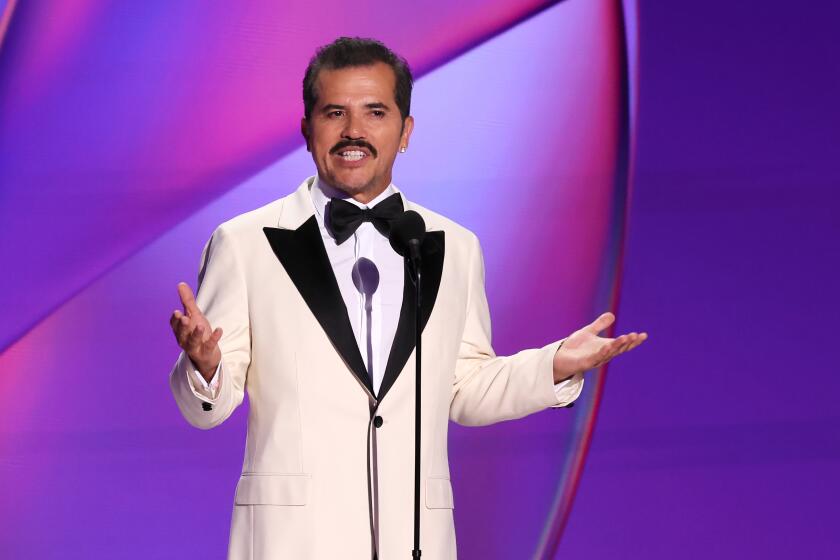Adept as the antihero
- Share via
The drug-addicted, ill-tempered doctor. The bartender with a penchant for gunfights and domestic abuse. The hallucinating shrink who is a full blown narcissist, the deeply depressed counter-terrorist with a perpetually clenched jaw and, mercifully, the utterly amoralistic lawyer.
Any other year, this might be a list of the “Sex and the City” boy toys, but this year it’s the characters played by those nominated for Emmy’s outstanding lead actor in a drama.
So what does it signify when the most emotionally healthy leading man is a lawyer played by James Spader?
The year of the antihero, apparently, in which debauchery, mental illness and seriously damaged social skills are the hallmarks of the New Man. How else to explain the draw of Ian McShane’s brutal, foul-mouthed saloon owner in HBO’s “Deadwood,” the endearing power of Hank Azaria’s self-obsessed, self-righteous psychiatrist in Showtime’s “Huff,” Kiefer Sutherland’s morose heat in Fox’s “24” or the swoon factor of Hugh Laurie’s Gregory House, a disease expert whose only real emotional connection seems to be to Vicodin.
“He tells the truth, come what may, no matter the consequences,” says Laurie in an attempt to explain the sex appeal of the sardonic and scruffy lead on Fox’s “House.” “These days that’s a bit thrilling. He can unlock secrets, and he isn’t afraid to do it no matter what the secrets are.”
For the record, Laurie adds, House’s perfect stubble is achieved by an electric razor setting of “2,” and he has no idea what is in the fake Vicodin he is continually popping, but perhaps he should ask after all.
House is not the only chemically dependent bad boy up for an award. Oliver Platt, nominated for outstanding supporting actor in a drama series, plays a womanizing, heroin-snorting celebrity lawyer and orgy organizer in “Huff” with Falstaffian vigor. William Shatner, nominated in the same category, plays Spader’s way-beyond-eccentric colleague in ABC’s “Boston Legal.” In the comedy category, Tony Shaloub’s “Monk” is a walking, talking embodiment of the Diagnostic and Statistical Manual of Mental Disorders, and Jeremy Piven, nominated for outstanding supporting actor in a comedy series, gives “Entourage” a spine of sleazy malice as agent Ari Gold.
“The best part of being an actor is that you get to do all sorts of things you never get to do in real life,” says Platt, whose Russell Tupper redefines bacchanal, not to mention bondage, with an unapologetic joie de vivre that makes it easy to forget how deeply troubled he is.
The show, he says, is very modern in that there is no real hero, and though he and the show’s writers do not want to glamorize addiction, they also want to show what it really looks like. “Self-destructive people can go on and on and on,” Platt says. Indeed, Russell wound up at the bottom of a staircase at the end of the season; does the nomination mean he’ll be getting up?.
“Well, who knows?” says Platt. “But seven Emmy nominations for the show ... he can’t die now.”
Monk, like many of this year’s nominees, is not the typical matinee idol type, Shaloub says, which makes sense because the strong and flawless characters are not reflective of the times.
“We live in an age of anxiety, bombarded by things that are fearful, and that is reflected in some of these characters. Monk is sort of the anti-Chili Palmer; he does everything wrong.”
The trick to playing the lovable ruffian, says Shatner, is finding the perfect proportion of love and rough. “This takes experience,” he says. “Which is why you see so many older actors being nominated. We know that the rough cannot be mean and the love cannot be true, and that’s as wise as I can get at 10 o’clock in the morning.”
As Ari Gold, the sleazy agent in “Entourage,” Piven sees himself as “a modern-day warrior for immediate gratificationers.” He admits it’s been fun to dig in and be as bad as he can be but adds that “there are dimensions in every devil. And anyway, you don’t have time to judge your characters, you have to just embrace them.”
McShane, whose Al Swearengen makes him the least likely to appear in a remake of “thirtysomething,” says troubled characters are always the most compelling because “the devil gets to play the best tunes, doesn’t he?”
“In ‘Deadwood’ there are no white hats and no black hats,” says McShane, “only deeply complicated people. Which is the way the world is.”
Speaking from London where he is working on a new Woody Allen film, McShane was living in extremes. On Thursday, the city observed two minutes of silence for those killed in last week’s bombings. “It’s very strange times,” McShane says, calling his nomination “brief sunshine through the clouds.”
He credits HBO for pushing the television narrative. “There’s more room for complicated stories,” he says. “Of course things are getting so specialized these days that no doubt there’ll be an antihero channel pretty soon.”
More to Read
The complete guide to home viewing
Get Screen Gab for everything about the TV shows and streaming movies everyone’s talking about.
You may occasionally receive promotional content from the Los Angeles Times.







